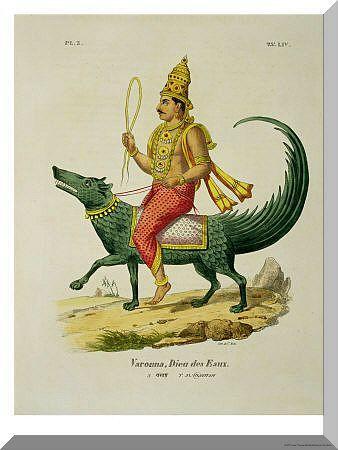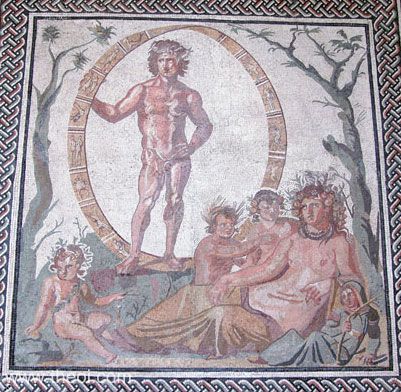Go to: Sun – Moon – Mercury – Venus – Mars – Jupiter – Saturn – Neptune – Pluto
In Greek mythology, Uranus is told to be the personification of heaven; the separation of heaven from earth was accomplished by one of his children, Cronus (sometimes identified with the planet Saturn) who mutilated his father and thus caused the separation.
Since there was no cult of Uranus in classical Greece, it is believed that this god was of a more ancient origin, probably its origin being Asia judging from the type of sword he was portrayed with.
Its name is derived from the Greek word Ouranos which is related to the Sanskrit name Varuna, which is the god who was initially associated with the sky, especially the night sky, but was also the god of the celestial ocean (geocentrically it’s the ocean surrounding the world).
Uranus is slightly visible to the naked eye as a blue-green point of light in the sky. The eyesight must be excellent though, and the sky very clear, in order to see it.
It was discovered in 1781 (during the American and French revolutions) as it orbited through the constellation of Gemini. It was discovered with the aid of a telescope and was the first newly found planet.
This planet’s discovery, of course, was anticipated by experienced astrologers, who knew that when the consciousness of the mass is raised, the discovery of a higher octave of Mercury would be found.
On the same basis, they predicted the discovery of Neptune and Pluto, the latter being the last one to be discovered. Uranus is the higher octave of Mercury, which was shown in older times geocentrically as the closest planet from the Earth not considering the Moon satellite.
The fact that Mercury, and not Venus, is the closest planet to the Earth, which was known in ancient times as well, is confirmed by the discovery of Uranus prior to the discoveries of the other two outer planets. That’s because we know Uranus to be the higher octave of Mercury, the planet of intelligence.
This means that Neptune is the higher octave of Venus (since Venus is the second closest planet to the Earth), and by its effects, we also now know that it’s true. I will write about the planet Pluto’s correspondence in a future article.
So humanity only discovers outer planets when their higher faculties corresponding to those outer planets are awakened. We are, therefore, opening up to some astral abilities, yet the spiritual plane is something that is unable to be reached by the mass of people. We know, however, that many people are aware of the astral plane and get astral experiences, though some have no idea what that is and therefore try to ignore or forget unusual experiences.
Uranus in astrological houses
If a human being is awakened, strong Uranus in one’s natal chart gives originality and higher-than-average intelligence. If a person is asleep, and Uranus is badly aspected, especially if the planet Mars is involved, it can cause accidents involving any sort of machines (like motorbikes, cars, factory equipment, anything electrical, and so forth), as well as weird eccentricities. A person can be a rebel without a cause.
In whichever astrological house it’s found, through it the person will try to express freedom and originality. The sign in which Uranus is located gives an understanding of what a person’s motivations behind that freedom or originality are.
If this planet is found in the twelfth astrological house, it gives secret enemies that attack when a person least expects. If it’s found near to the Ascendant, it gives a highly original outlook (if close to the Ascendant from the twelfth house, that is), and an unusual appearance (or could be an unusual way of dressing) if it’s in the first house.
Since it’s the author of the original thought, it makes people who are awakened to its vibrations lonely, if not socially then at heart. They feel different from the rest because of their unique outlook. If the force of originality is abused, it may lead to forming cults and trying to dominate, like the myth of Uranus describes the sky god being unwilling to share his dominion with any of his sons.
Also, awakened creativity may lead one to focus only on the creation, not paying attention to how those inventions will be used by the world. We can see that in the destiny of Nikola Tesla’s inventions, which were sometimes used for evil and not good.

Nikola Tesla’s birth chart. (He was the master of electricity and a great inventor) – although Uranus is in its fall, it’s in the first house and is well-aspected and trines Midheaven. 23° Taurus, according to the fatalistic astrology, causes one to give everything to others, yet receiving only ingratitude. I think this sums up his life quite well.
In the second house, Uranus gives unexpected events in the area of finances, like winning a huge amount only to lose it. In the third house, it gives originality in self-expression. In the fourth house, it gives unusual family circumstances; in the fifth house, it gives unusual pastime pursuits or having hobbies involving internet or technology, like playing online games.
In the sixth house, it gives many changes in employment, and a native may suddenly decide to quit without any prior warning. In the seventh house, it usually gives divorces. In the eighth house, it may give an unusual death, or death caused by machines or electricity, but there must be some further negative indications to confirm such a destiny.
In the ninth house, it gives rebelliousness against the established order of things. In the tenth house, it gives an unexpected change of the public stance, such as instant fame or a fast fall from grace. In the eleventh, it gives friends interested in technology, unexpected beginnings, and ends of friendships, or unusual friendships. I’ve already mentioned the workings of Uranus in the twelfth house.
These are, of course, just very general ways how Uranus works in each house, as aspects to it as well as zodiac signs in which it’s found and other astrological factors must be taken into consideration before forming a judgment about its workings.
But in general, it gives unexpected events, accidents, or anything else to do with technology and electricity, and originality. It rules the zodiac sign Aquarius, which before was told to be ruled by Saturn, and now Saturn is its co-ruler. Uranus rules the eleventh house of friends and common goals.
The governor of Astrology and the supernatural
A strong Uranus’ influence may encourage people to study astrology, and also its influence can cause supernatural phenomena. It rules magic and things considered paranormal. Since it’s a slow-moving planet, its effects are long-lasting, and it, being an outer planet, tends to affect the mass-thought. So when a trend starts spreading, it’s very likely that a Uranian influence is involved.
Uranus teaches one to dissolve established ways that hinder the progress and to become more open-minded and tolerant. Whoever becomes receptive to its influences will become the leader of something new, something original, like some new way of doing things, or some new field or thought.
Uranus as a ruler of the sky and innovation
Uranus rules things connected with the sky and air, like electricity, wireless communications, artificial intelligence, and lightning.
It also rules everything innovative, from inventions to original thoughts. It rules technology and science.
It’s a very unpredictable planet, and thus it being strong in someone’s chart may give unpredictable behavior and a frequent change of routine.
Uranus also rules unpredictable events of the earth, like earthquakes, volcano eruptions, also explosions, and anything that is unpredictable in general.
It also sometimes manifests in violent ways, destroying existing structures and introducing anarchy.
It is due to its influence that people are inspired to break barriers imposed by caste, society, or religion. It respects different views and unusual life choices and embraces individuals for who they are despite their differences.
A strong Uranus in one’s chart can indicate a genius or someone mentally unstable. Sometimes it can make a person into the one that inspires the progress of society; but it can also cause the person to experience mental breakdowns and psychological issues. A person strongly ruled by Uranus but who is spiritually undeveloped may become so different from the society that he or she may even become dangerous to the well-being of others.
But if an individual can handle its higher vibrations, he can be the force behind the unification of humanity despite individual differences, since Uranus is, after all, the ruler of the eleventh house of friends. It will also encourage the destruction of organizations based on hierarchy.
Uranus as responsible for a midlife crisis
He travels through the zodiac in around 84 years and stays in each sign for around 7. It’s the planet that is responsible for the mid-life crisis in a human life, which hits when a person is around 42. It usually brings huge changes in ones’ life and it happens when transiting Uranus is in opposition to where it was at birth. Its transit effects are long-lasting.

Uranus causes a midlife crisis during which people may try to prove how cool or still young they are.
This midlife-crisis will most greatly affect people who have not fulfilled their goals and who lived uneventful lives.
Then they will start feeling that they are missing out on life and there will be a sense of urgency to do things that are not usual for them, or the urgency to achieve goals that were not realized.
Also, there might be a feeling that one is getting old and thus such people may try to form relationships with younger people or wear revealing or tight clothes to prove themselves still desirable.
Men may try to look cool to attract the attention of ladies or do cool things like riding motorcycles and so forth.
But if a person has lived life to the fullest, it may simply bring a more mature attitude, or a wish to process all the things one experienced, or it can encourage one to take some more mature direction in life.
Finally…
That’s all the information I have for you about Uranus, and if you have some more insights to share about this planet, please leave a comment below.
Go to: Sun – Moon – Mercury – Venus – Mars – Jupiter – Saturn – Neptune – Pluto
References
- Uranus in Greek Mythology – Encyclopedia Britannica
- Mythic Astrology: Archetypal Powers in the Horoscope by Ariel Guttman.
- Varuna – New World Encyclopedia
- Uranus in Astrology – The Astro Codex
- A Treatise on Astrology by Aleister Crowley
- Alan Oken’s Complete Astrology: The Classic Guide to Modern Astrology by Alan Oken
- Astrologer’s Handbook by Frances Sakoian
- Mercury as the Closet Planet from the Earth – The Wire


